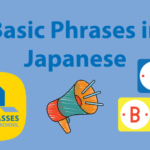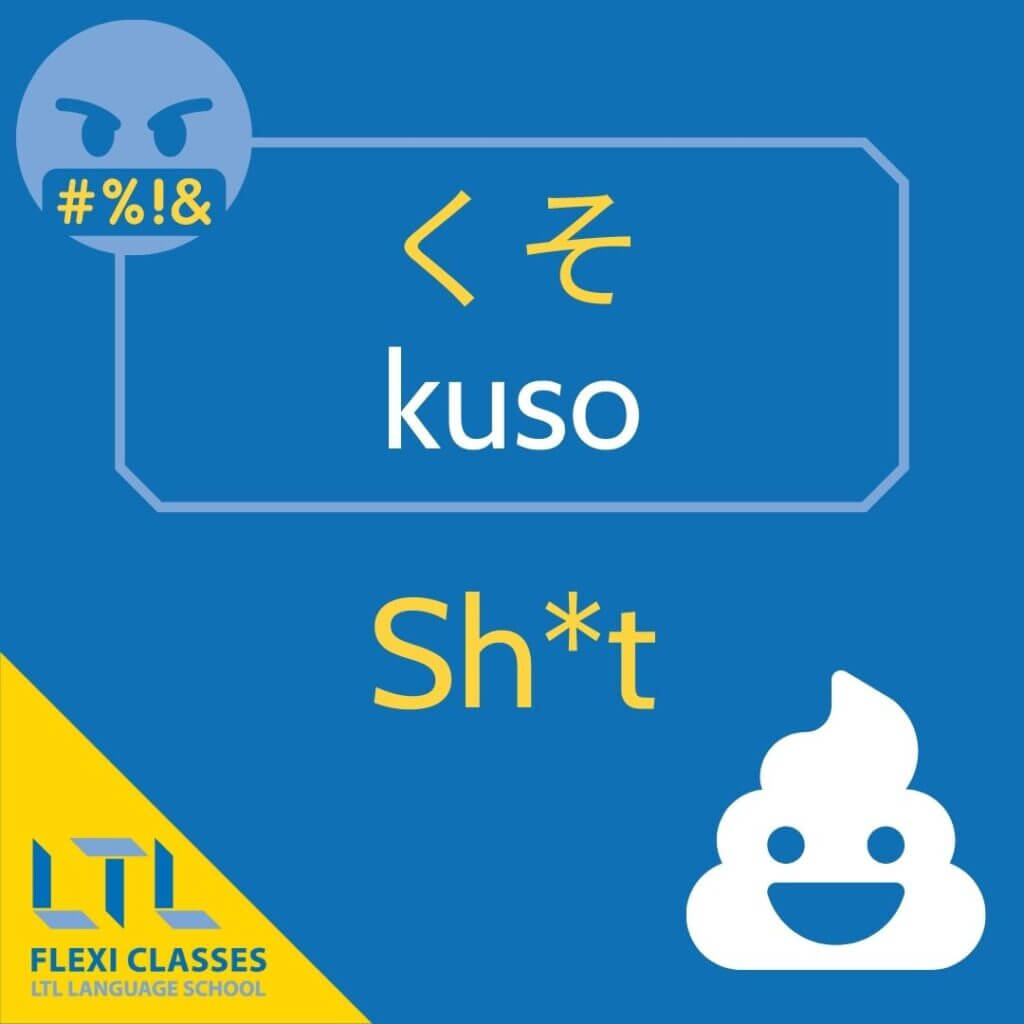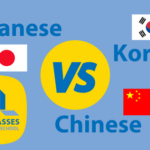Japanese Swear Words // 15 To Use With Caution
The Most Common Curse Words and Expressions in Japanese 😡
What are some common swear words in Japanese? Or perhaps the question should be, ARE there swear words in Japanese?!
A bizarre question with an equally bizarre answer, as there actually aren’t really swear words in Japanese.

You may be asking yourself… ‘But I’ve seen captions in anime say fck???’ ‘How do they show their anger???’ etc.
And you wouldn’t be wrong!
Although there is no one single word for ‘fck’ in Japanese, there are ways to express it.
And actually, you’ll find that most swear words in Japanese, or ways to swear in Japanese, are done by using more common words or phrases and adding a couple of words or changing the way you say them.
So let’s take a look at 15 swear words in Japanese and learn the most important thing in the language… How to swear in Japanese!
Swearing in Japanese || When to Use Swear Words in Japanese
Swearing in Japanese || Teme | てめぇ
Swearing in Japanese || Yaro | ヤロ
Swearing in Japanese || Kuso | くそ
Swearing in Japanese || Fuzakenna
Swearing in Japanese || Aho | アホ / Baka | バカ
Swearing in Japanese || Uzai | ウザい
Swearing in Japanese || Yatsu | 奴
Swearing in Japanese || Shinee | 死ねえ
Swearing in Japanese || Kuso Kurae | くそくらえ
Swearing in Japanese || Busu | ぶす
Swearing in Japanese || Yariman | やりまん
Swearing in Japanese || Warugaki | わるがき
Swearing in Japanese || Kutabare | くたばれ
Swearing in Japanese || Damare Konoyaro | だまれこのやろう
Japanese Swear Words || FAQs
When to Use Swear Words in Japanese
It’s worth noting when to use swear words in Japanese.
The answer to this is quite simple… not often. It is not usual in Japan to use swear words or bad language in public.
👉 Of course, you certainly shouldn’t say any of the following swear words in Japanese or phrases to anyone higher up than you, as Japanese is a very respectful language and culture. Unless you know someone really well, it is a good idea just to never use these.
In fact, using informal language to someone higher up than you can be deemed offensive.
Be careful when speaking to elders, your colleagues at work, or senpai.
You should also be careful of sounding too aggressive or offensive when saying such phrases to someone younger than you.

Basic Phrases in Japanese // Learn 32 Essential Phrases (With Flashcards & FREE Quiz)
Basic Phrases in Japanese // Learn these phrases to make your first steps when learning Japanese. We teach you how to get by when speaking basic Japanese.
1. Teme | てめぇ

てめぇMeaning: YOU!! (In an angry/informal way. This word makes me think of ‘you + an angry emoji.)
Funny one this isn’t it! How can YOU be a swear word in Japanese?!
This is actually heard a lot in anime.
Although not technically a swear word in Japanese since it does just mean ‘you’, said in an angry or informal way it can be very offensive.
It’s often used in conjunction with other insults.
FOR EXAMPLE:
てめぇ、何してんだよ
Hey you! What the hell are you doing?2. Yaro | ヤロ
ヤロMeaning: Bastard
Not a word in itself, ‘yaro’ is added to other words or insults to add ‘bastard’ onto the end of it.
Often used is ‘bakayaro’. Baka バカ , which we will see further down, means ‘stupid’. So bakayaro バカヤロ is ‘stupid bastard’.
Lovely.
3. Kuso | くそ

くそMeaning: Shit
The literal meaning of ‘kuso’ is shit, and one of the few Japanese swear words that pretty much is very similar to the usage in English.
You can also add it onto words to emphasise it, like how in English you might say ‘f*cking difficult’’.
However, translating it in this way is a bit problematic because f*cking sounds much stronger in English than in Japanese.
Whereas kuso can actually be used quite commonly without such a strong connotation.
Kuso is one of the most popular swear words in Japanese for foreigners to learn, it can be said when you spill coffee on yourself, bump into something etc.
4. Fuzakenna | ふざけるな
ふざけるなMeaning: ‘No f*cking way’
Another one the Japanese anime fans will recognise, fuzakenna is used often in anime.
It’s used in situations where you’re really annoyed and frustrated. Maybe something unexpected has happened or someone says something unexpected.
It roughly translates to something like ‘you’re freaking kidding me’ or ‘f*ck off, no way’.

5. Nani Shitendayo | 何してんだよ
何してんだよMeaning: ‘Whatchu doin?’
More of a softer swear word in Japanese that can seem harsh if you want to say it particularly in a more aggressive manner.
何してんだよ can vary on a scale from ‘Huh?’ to ‘WTF you doing?!’.
It’s very useful in any situation you’re pretty annoyed by.
6. Aho | アホ // Baka | バカ

アホ バカMeaning: Idiot/stupid
Both of these are used to mean ‘stupid’ or ‘idiot’, so it’s generally not the harshest of swear words in Japanese to use.
The difference in the two is mainly dialectal.
In Kansai (Osaka & Kyoto regions), you will hear ‘baka’ much more than in Kanto (Tokyo region) where ‘aho’ is much more commonly used.
Remember earlier we saw how that baka (バカ) can be combined with yaro ヤロ to make bakayaro バカヤロ meaning ‘stupid bastard’.
7. Uzai | ウザい
ウザいMeaning: Gross
Uzai is another kind of light curse or swear word.
It’s not a swear word in itself but you can use it to express your disgust or anger, as it means ‘annoying’ or ‘yuckkk’.
It’s also a great way to tell someone they’re being too noisy as it also means ‘noisy’ or ‘loud’.

Japanese vs Korean vs Chinese | Which Is Really The Hardest?
Thinking about learning an East Asian language and don’t know which one to go for? Japanese vs Korean vs Chinese – it’s a tough choice right?!
8. Yatsu | 奴
奴Meaning: Guy
Yatsu is a swear word in Japanese that does just mean ‘guy’… however, it carries a negative connotation.
By using 奴, you are not directly insulting someone, but as I mentioned earlier on in this article, there is a certain way to talk down to someone without explicitly doing so.
This is definitely one of those examples. No one would enjoy being referred to as ‘yatsu’.
Using 奴 will show you don’t have a lot of respect for that person/people.
In this example, you can see how context and tone impact the meaning:
この学校って、変な奴ばかりだな
This school is full of freaks/weirdos.9. Shinee | 死ねえ

死ねえMeaning: Die! (Go and die!)
Nice sentiment shown here!
As the English translation shows, this one is pretty offensive.
It literally means ‘to die’ in the imperative, therefore its meaning really is “Go and die.”
Save this one for when you’re really angry…
(Or joking with really good friends.)
10. Kuso Kurae | くそくらえ
くそくらえMeaning: Eat shit
Another literal translation that works, ‘kuso’ as we learnt earlier means ‘shit’. ‘Kurae’ is ‘to eat’ in the imperative, i.e. = eat shit!
Pretty offensive as far as swear words in Japanese go…
11. Busu | ぶす
ぶすMeaning: Ugly (woman)
A pretty strong insult when used on a woman, it means ‘ugly’.
We definitely recommended you DO NOT throw this one around randomly!
12. Yariman | やりまん
やりまんMeaning: Slut
Whilst you’re out offending women, why not go the whole way…!
‘Yariman’ in Japanese means the same as ‘slut’ in English, so it’s pretty simple to know when you should and shouldn’t use this swear word in Japanese (i.e. not very often).

Japanese Numbers // Your Complete Guide (With Quiz Included)
DO NOT WORRY – learning Japanese numbers is not so difficult. Learning the numbers in Japanese can also open up some unexpected doors.
13. Warugaki | わるがき
わるがきMeaning: Brat
This is a good swear word in Japanese to use on those younger than you, especially children (although we most certainly aren’t endorsing swearing at little Japanese kids)!!
Quite interchangeably used with when you might say the word ‘brat’ in English.
class="wp-block-gallery has-nested-images columns-default is-cropped wp-block-gallery-1"> class="wp-block-image 309 https://flexiclasses.com/japanese/wp-content/sites/33/2021/07/Swear-words-in-Japanese-7-1024x1024.jpg Swear-words-in-Japanese class="wp-image-308"/> class="wp-block-image class="wp-image-309"/> wp-block-heading has-blue-color has-text-color id="chapter-15">14. Kutabare | くたばれ class="wp-block-quote">[speak くたばれ
Meaning: Fuck you
Not much explanation needed for this Japanese swear word.
Use it with caution!
15. Damare Konoyaro | だまれこのやろう (damare konoyarou)
だまれこのやろうMeaning: Shut Up, You Bastard!
Let’s end on a high note!
Or a really bad note… One of the worst swear words in Japanese, i
だまれこのやろう combines ‘shut up’ with ‘bastard’ that we learnt earlier. Therefore making the poetic phrases ‘shut up, you bastard’. 👀
Needless to say, save this one for those times when you really need it… Don’t go shouting it around! But you might want to listen out for it in Japanese anime…
So that’s it!
I love learning about swear words in Japanese because it really is an art form almost.
In English, we have simple words that indicate strong emotions. Of course, we have phrases too. But Japanese, once again, is much more intricate and instead relies a lot on tone, what you’re adding the phrase to, and who you’re saying it to.
Just when you were starting to think Japanese isn’t all that difficult, they had to go and make swearing hard, too.
Nevertheless, a lot of these swear words in Japanese you will hear regularly in anime, so you can watch and listen. You won’t hear them too much in real life, as Japanese culture is very reserved and polite.
They’re certainly worth learning, and in a rowdy evening izakaya you’re bound to hear these words thrown around as people get loose on a cold pint of Sapporo.
If you know of anymore swear words in Japanese we missed out, why not tell us in the comment section below, we’d love to learn more together!
If you love learning to curse in other languages, we’ve got plenty more, starting with these cutting curse words in Vietnamese!
And there’s plenty more where that came from too…
- Over 50 Chinese Swear Words
- 15+ Japanese Swear Words
- 10 commonly spoken Korean Swear Words
- 15+ Russian Swear Words
- Italy’s favourite swear word (+ it’s many meaning)
Swear Words in Japanese || FAQs
Is ku so (くそ) rude?
Kuso literally means sh*t and can also sometimes mean f*cking, however it doesn’t have a strong a connotation with these words in English so isn’t as rude.
Is swearing publicly in Japan common?
The answer to this is quite simple… it’s not common at all!
It is not usual in Japan to use swear words or bad language in public.
How do you say f*ck in Japanese?
There isn’t actually a direct translation for f*ck in Japanese but other words can be used for a similar effect such as ku so (くそ).
How do you say sh*t in Japanese?
Sh*t in Japanese is literally ku so (くそ), however this can also be translated as f*cking.
How do you say f*ck you in Japanese?
F*ck you in Japanese is くたばれ which is pronounced ku ta ba re.
Are there swear words in Japanese?
Technically there aren’t really swear words as such in Japanese.
Instead you’ll find that most swear words in Japanese, or ways to swear in Japanese, are done by using more common words or phrases and adding a couple of words or changing the way you say them.
Want More From LTL?
WANT TO LEARN JAPANESE? Check out our online Japanese courses here.
We offer a 7-day free trial to all new students where you can study 24/7.
What about studying Japanese in Japan instead? We’ve got your back. Our Japanese courses in Tokyo can either be taken in small groups of no more than 5 students or individually for a more tailored experience.
We even offer incredible homestay experiences in Tokyo as well.
Come and be a part of this amazing community.










6 comments
Naughty
😅
I rarely hear Japanese swear. Maybe my level isn't good enough yet ahaha
It's certainly not as common in Japanese as other languages.
[…] Are there swear words in Japanese? Technically there aren't really swear words as such in Japanese. Instead you'll find that most swear words in Japanese, or ways to swear in Japanese, are done by using more common words or phrases and adding a couple of words or changing the way you say them. via […]
[…] https://flexiclasses.com/japanese/swear-words/ […]